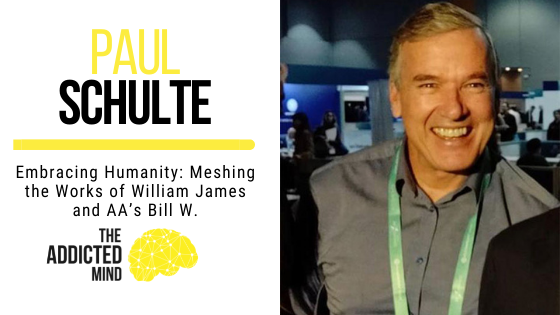On today’s episode of The Addicted Mind Podcast, Duane talks with Paul Schulte, the author of We Agnostics: How William James, Father of American Psychology, Advanced A Spiritual Solution to Addiction: How a Venerated Harvard Doctor Inspired the 12 Step Movement.
Paul is going to talk about Williams James’s philosophy, what he brought to addiction treatment and addiction care, and how his work strongly influenced the work of Bill Wilson, founder of the 12-step program, Alcoholics Anonymous.
He talks about how William James was able to articulate the theme he saw in human change – something that has been talked about in religious circles and spirituality for over 3,000 years. It’s the theme of a person who is lost, feels broken, and ultimately is able to find serenity and calmness.
With a degree in drug and alcohol addiction counseling, Paul did an internship at the UCLA School of Medicine. There, he was drawn into what was going on with the different types of treatment and the influences of the 12-step movement.
He came across William James’ Book, The Varieties of Religious Experience, which has had a tremendous influence on American life. Paul very much resonated with William’s experiences, how he had developed all of his ideas about the unconscious, and where these urges to suddenly stop what seems like a chronic behavior comes from in humans.
William questions what causes these transformations in humans. Way before Freud developed his idea of the subconscious, William was one of the early pioneers of the subconscious and the desire to move towards a new form of regeneration of the human spirit coming from the subconscious.
In this episode, you will hear:
- How Paul resonated with William James
- The universality of the human condition
- The 3 marks of the soul-sick
- The two-fold mark of a spiritual experience
- Why William James says we are all agnostic
- How Bill W. adopted the idea of William James
- Beautiful analogies in William’s book that describes the human experience and its similarities to the 12-step movement
- Dealing with chaotic emotions and purging fear
- Not excusing the behavior but forgiving it
- The sense of regeneration
Key Quotes:
[06:19] – “William James was on to something about the obsession of the mind. But certainly, the spiritual element of trying to get cleaned up. That was a very big quantum leap in the understanding of addiction.”
[10:09] – “I had this thing in me, this weird soul-sickness in the way before I picked up my first drink.”
[14:20] – “That feeling of self-loathing, and alienation and fear, which are basically the three marks of that soul sick.”
[14:39] – “The mark of a spiritual experience is twofold. One, life gets bigger. And number two, we feel like we belong and that there’s a union with other people.”
[23:26] – “We’re not falling apart, when we think we’re falling apart, we’re actually falling together.”
[27:05] – “It’s from this sense of destitution, that we rebuild ourselves, and when all the shams and all the lies of dishonesty are peeled away.”
[30:50] – “We don’t go around excusing behavior. We forgive the behavior.”
[33:57] – “The fundamental point of helping others is self-forgetfulness, and the more that we engage in self-forgetfulness, the better off we are going to be because we get away from that oppressive ego, which wants to reassert itself.”
Subscribe and Review
Have you subscribed to our podcast? We’d love for you to subscribe if you haven’t yet.
We’d love it even more if you could drop a review or 5-star rating over on Apple Podcasts. Simply select “Ratings and Reviews” and “Write a Review” then a quick line with your favorite part of the episode. It only takes a second and it helps spread the word about the podcast.
If you really enjoyed this episode, we’ve created a PDF that has all of the key information for you from the episode. Just fill in your information below to download it.
Supporting Resources:
The Varieties Of Religious Experience: A Study In Human Nature

